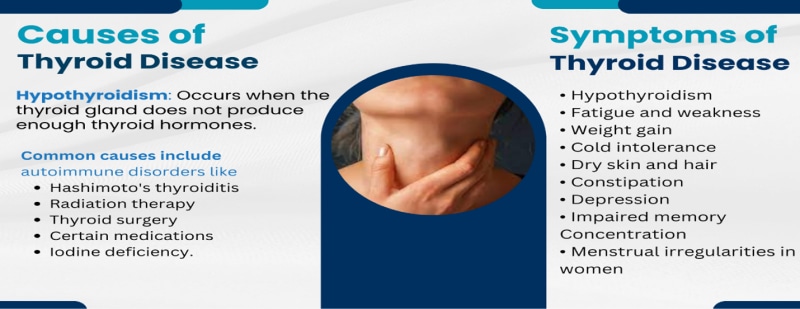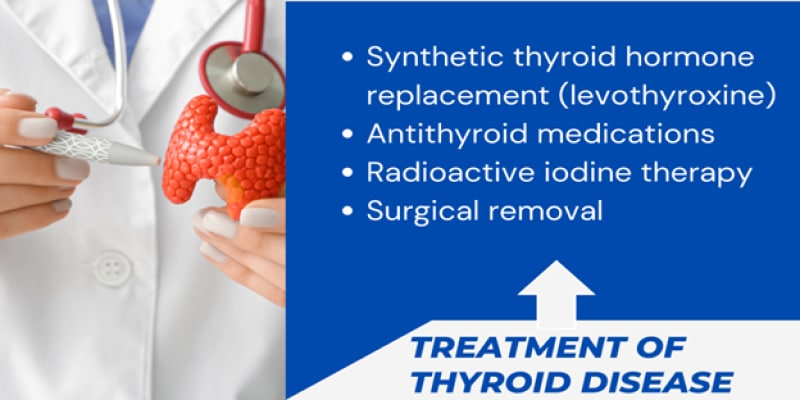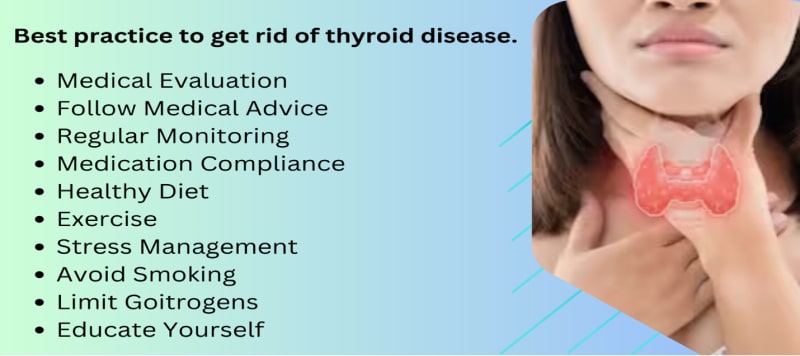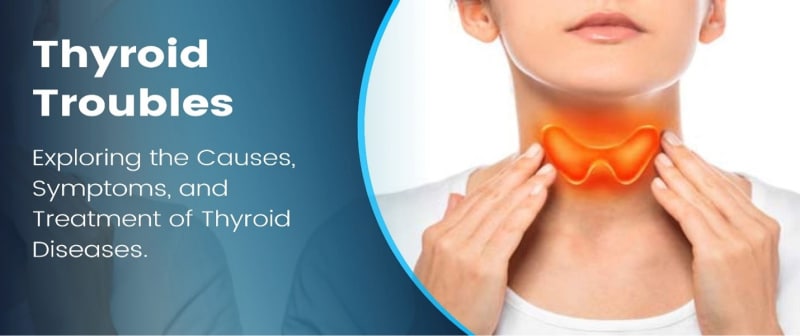Thyroid disease refers to any medical condition that affects the thyroid gland, a small butterfly-shaped gland located in the neck. The thyroid gland plays a crucial role in regulating various bodily functions, including metabolism, energy production, and the functioning of other organs. There are several types of thyroid disorders, with the most common being hypothyroidism and hyperthyroidism.
Causes of Thyroid Disease:

Hypothyroidism: Occurs when the thyroid gland does not produce enough thyroid hormones. Common causes include autoimmune disorders like Hashimoto’s thyroiditis, radiation therapy, thyroid surgery, certain medications, and iodine deficiency.
Symptoms of Thyroid Disease:
- Hypothyroidism
- Fatigue and weakness
- Weight gain and difficulty losing weight
- Cold intolerance
- Dry skin and hair
- Constipation
- Muscle aches and stiffness
- Depression and mood swings
- Impaired memory and concentration
- Menstrual irregularities in women
Treatment of Thyroid Disease:

The treatment of thyroid disease depends on the specific type and severity of the condition.
- Synthetic thyroid hormone replacement (levothyroxine) is the standard treatment. It helps restore normal hormone levels in the body.
- Antithyroid medications (such as methimazole or propylthiouracil) can help reduce the production of thyroid hormones.
- Radioactive iodine therapy may be used to destroy part of the thyroid gland and reduce hormone production.
- Surgical removal of the thyroid gland (thyroidectomy) may be considered in certain cases.
It’s important to note that thyroid disorders can have a significant impact on overall health and well-being. If you experience symptoms related to thyroid disease, it’s essential to consult a healthcare professional for proper evaluation, diagnosis, and treatment. Regular monitoring and medication adjustments, if necessary, can help manage thyroid conditions effectively.
Natural treatment of thyroid disease?
Natural treatment options for thyroid disease can be used in conjunction with conventional medical approaches but should not replace them entirely. Always consult with a healthcare professional before starting any new treatments. Here are some natural remedies and lifestyle changes that may help support thyroid health:

Iodine-Rich Foods: Iodine is essential for thyroid hormone production. Include iodine-rich foods in your diet, such as seaweed, iodized salt, fish, and dairy products. However, be cautious with iodine supplementation, as excessive intake can worsen certain thyroid conditions.

Selenium: Selenium is a mineral that plays a role in thyroid hormone metabolism. Foods like Brazil nuts, sardines, and turkey contain selenium. Adequate selenium intake may help reduce inflammation associated with some thyroid disorders.

Ashwagandha: This adaptogenic herb is believed to help balance hormone levels and reduce stress, which can be beneficial for individuals with thyroid disorders. It may support the thyroid by normalizing hormone production.

Vitamin D: Vitamin D deficiency has been linked to autoimmune thyroid disorders. Spend some time in the sun to naturally boost vitamin D levels or consider a supplement if advised by a healthcare professional.

Lifestyle Changes: Managing stress through practices like yoga, meditation, or deep breathing can help support thyroid health. Chronic stress can negatively impact hormone production and exacerbate thyroid conditions.

Gluten-Free Diet: For individuals with Hashimoto’s thyroiditis (an autoimmune thyroid disease), adopting a gluten-free diet may be beneficial. Some studies suggest a link between gluten sensitivity and autoimmune thyroid conditions.

Probiotics: A healthy gut may play a role in managing autoimmune conditions, including certain thyroid disorders. Consider incorporating probiotic-rich foods like yogurt, kefir, sauerkraut, or kimchi into your diet.

Exercise: Regular physical activity can help boost metabolism, improve mood, and support overall well-being. Aim for moderate exercise most days of the week.

Limit Goitrogenic Foods: Some foods, like cruciferous vegetables (broccoli, cauliflower, cabbage, etc.) and soy products, contain goitrogens that may interfere with thyroid function. Cooking these foods can help reduce their goitrogenic effects.

Herbal Supplements: Certain herbal supplements, such as guggul, bugleweed, and lemon balm, have been used traditionally to support thyroid health. However, their efficacy and safety vary, so consult with a healthcare professional before using them.
Remember, while natural remedies may offer support, they are not a substitute for medical treatment. Thyroid disease requires careful monitoring and management by qualified healthcare providers. Work with your doctor to create a comprehensive treatment plan that suits your individual needs.
Best practice to get rid of thyroid disease.
The management of thyroid disease requires personalized care from qualified healthcare professionals. There is no guaranteed way to completely “get rid” of thyroid disease, but it can often be effectively managed and controlled. Here are some best practices for managing thyroid disease:

Medical Evaluation: If you suspect you have thyroid disease or have been diagnosed with it, consult a healthcare professional for a proper evaluation and diagnosis. They will conduct relevant tests and assessments to determine the type and severity of your thyroid condition.
Follow Medical Advice: Adhere to the treatment plan prescribed by your doctor. This may involve medication, lifestyle changes, or other therapies based on the specific type of thyroid disorder you have.
Regular Monitoring: Attend follow-up appointments as recommended by your healthcare provider. Regular monitoring of thyroid hormone levels and overall health is essential for effective management.
Medication Compliance: If your doctor prescribes medication, take it as directed. Thyroid hormone replacement therapy, for instance, is often used for hypothyroidism and requires consistent adherence for optimal results.
Healthy Diet: Focus on a balanced diet with adequate nutrients, including iodine-rich foods (but avoid excessive iodine intake), selenium, and other essential nutrients that support thyroid function.
Exercise: Engage in regular physical activity to support overall health, boost metabolism, and manage stress.
Stress Management: Chronic stress can impact thyroid function, so find healthy ways to manage stress, such as through meditation, yoga, or hobbies.
Avoid Smoking: Smoking may exacerbate certain thyroid conditions and increase the risk of complications.
Limit Goitrogens: If you have hypothyroidism, consider moderating the intake of goitrogenic foods, such as raw cruciferous vegetables and soy products, as they may interfere with thyroid function.
Educate Yourself: Learn about your condition and how to manage it effectively. Understanding your thyroid disorder can empower you to make informed decisions about your health.
It’s crucial to work closely with your healthcare team to tailor a comprehensive treatment plan for your specific needs. The management of thyroid disease varies depending on the type and severity of the condition, and individual responses to treatments can differ. Be patient, and remember that consistent care and proactive management can significantly improve your quality of life while living with thyroid disease.
Frequently Asked Questions (FAQ) about Thyroid Disease
1. What is the thyroid gland, and what does it do?
The thyroid gland is a small, butterfly-shaped gland located in the front of the neck. It produces hormones (T3 and T4) that play a crucial role in regulating various bodily functions, including metabolism, energy production, and the functioning of other organs.
2. What are the common types of thyroid disorders?
The most common types of thyroid disorders are:
Hypothyroidism: When the thyroid gland produces insufficient hormones.
Hyperthyroidism: When the thyroid gland produces an excessive amount of hormones.
Thyroid nodules: Abnormal growths or lumps within the thyroid gland.
Thyroiditis: Inflammation of the thyroid gland.
Thyroid cancer: A less common but serious condition where cancer develops in the thyroid gland.
3. What causes thyroid disease?
The causes vary depending on the type of thyroid disease:
Hypothyroidism is often caused by autoimmune disorders, radiation therapy, thyroid surgery, certain medications, or iodine deficiency.
Hyperthyroidism can be caused by autoimmune conditions, thyroid nodules, thyroiditis, or certain medications.
4. What are the symptoms of thyroid disease?
The symptoms differ for hypothyroidism and hyperthyroidism:
Hypothyroidism symptoms: Fatigue, weight gain, cold intolerance, dry skin, constipation, muscle aches, depression, and menstrual irregularities in women.
Hyperthyroidism symptoms: Unintentional weight loss, rapid heartbeat, increased appetite, anxiety, tremors, heat intolerance, and changes in bowel movements.
5. How is thyroid disease diagnosed?
A healthcare professional may perform several tests, including blood tests to measure thyroid hormone levels (T3, T4, and TSH), ultrasound to assess the gland’s structure, and biopsy for suspicious nodules or cancer.
6. What are the treatment options for thyroid disease?
Hypothyroidism is typically treated with synthetic thyroid hormone replacement (e.g., levothyroxine) to restore hormone levels.
Hyperthyroidism can be managed with antithyroid medications, radioactive iodine therapy, or, in severe cases, thyroidectomy (surgical removal of the thyroid gland).
7. Can thyroid disease affect fertility and pregnancy?
Yes, thyroid disorders can affect fertility and pregnancy. Women with untreated thyroid disease may have difficulty conceiving, and pregnant women with uncontrolled thyroid issues may face complications during pregnancy, such as preterm birth or developmental problems in the baby. Regular monitoring and proper management are essential for pregnant women with thyroid disorders.
8. Are thyroid disorders hereditary?
Some thyroid disorders, such as Hashimoto’s thyroiditis and Graves’ disease, can have a genetic component, making them more likely to run in families. However, not everyone with a family history will necessarily develop thyroid disease.
9. Can lifestyle changes help manage thyroid disease?
While lifestyle changes cannot cure thyroid disease, they can help support overall health and improve symptoms. Managing stress, maintaining a balanced diet, and getting regular exercise are beneficial for individuals with thyroid conditions.
10. Is thyroid cancer common, and can it be treated successfully?
Thyroid cancer is relatively uncommon but is one of the most treatable cancers if detected early. Treatment options may include surgery, radioactive iodine therapy, external radiation therapy, or targeted drug therapy, depending on the type and stage of cancer.
Always consult a healthcare professional for personalized information and guidance on thyroid disease management.
To schedule an in person on Tele-medicine appointment
please call our office at 1-212-794-8800 or email us at info@patientsmedical.com. We look forward to hearing from you
Our medical center in New York City.
Patients Medical PC
1148 Fifth Avenue, Suite 1B
New York, NY 10128
About Patients Medical

PatientsMedical.com is headed by Dr. Rashmi Gulati, MD who is a board-certified physician with over 20 years of integrative, functional and internal medicine experience.
Patients Medical is a holistic wellness center dedicated to helping its clients discover health and rediscover vitality. Their physicians combine the best of conventional and holistic medicine with state-of-the-art equipment to provide comprehensive care and treatment to their patients. They focus on the root causes of secondary medical conditions, integrating modern medicine, holistic practices, and natural supplements to fast-track healing and prevent disease. Every year, thousands of existing and new patients continue to visit the center, seeking an alternative medical approach to a variety of health issues.
Patients Medical provides extensive weight loss support. For details see: Patientsmed, Mounjaro Weight Loss, Ozempic Weight Loss , Semaglutide For Weight Loss/, and Wegovy Weight Loss
Patients Medical provides extensive reproductive medicine support through its affiliates. For details see: Surrogacy4All , Eggdonors4All and Indian Egg Donor .
In addition, Patients Medical provides access to over 15,000 affordable supplements on their affiliated website: MySupplements.store


